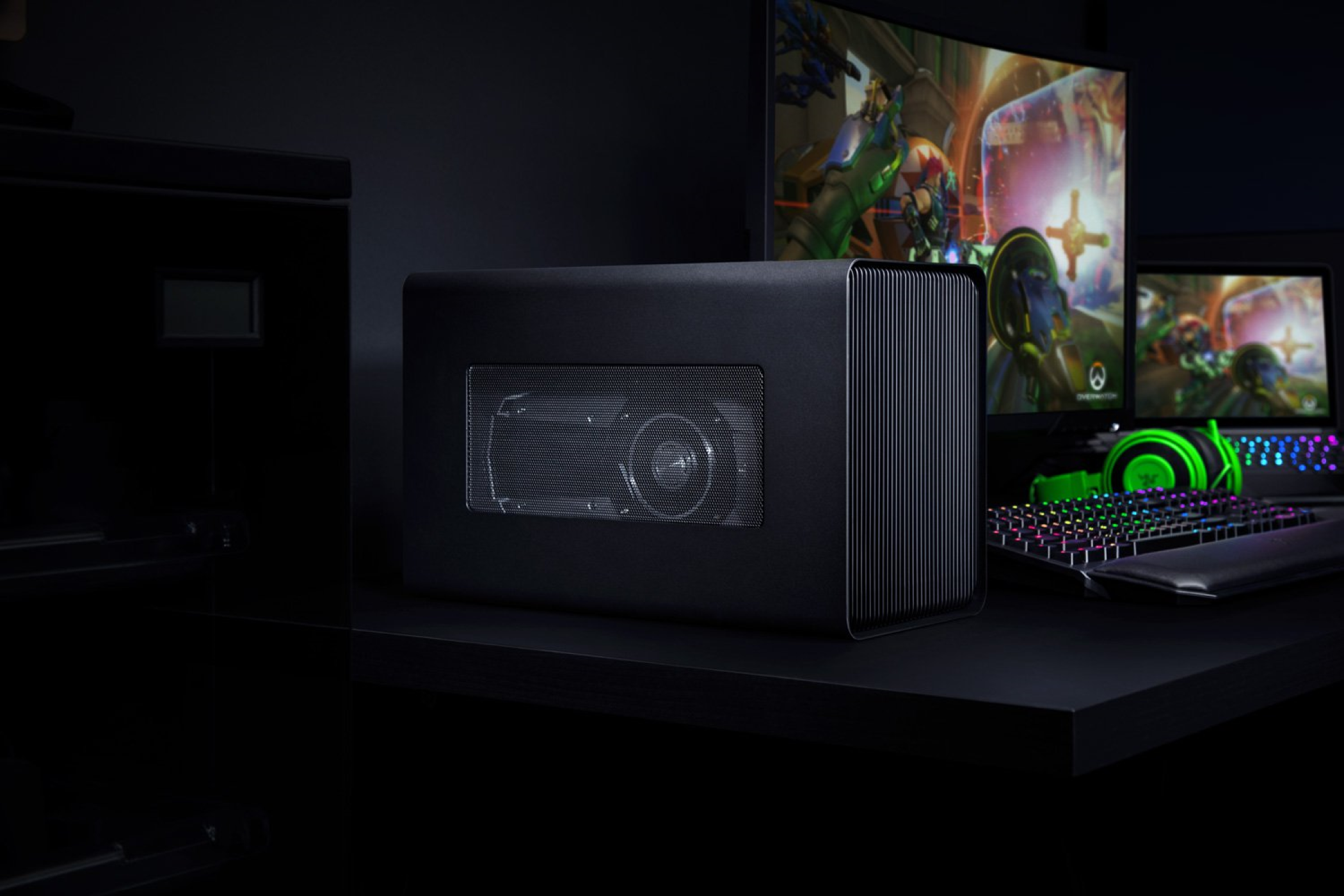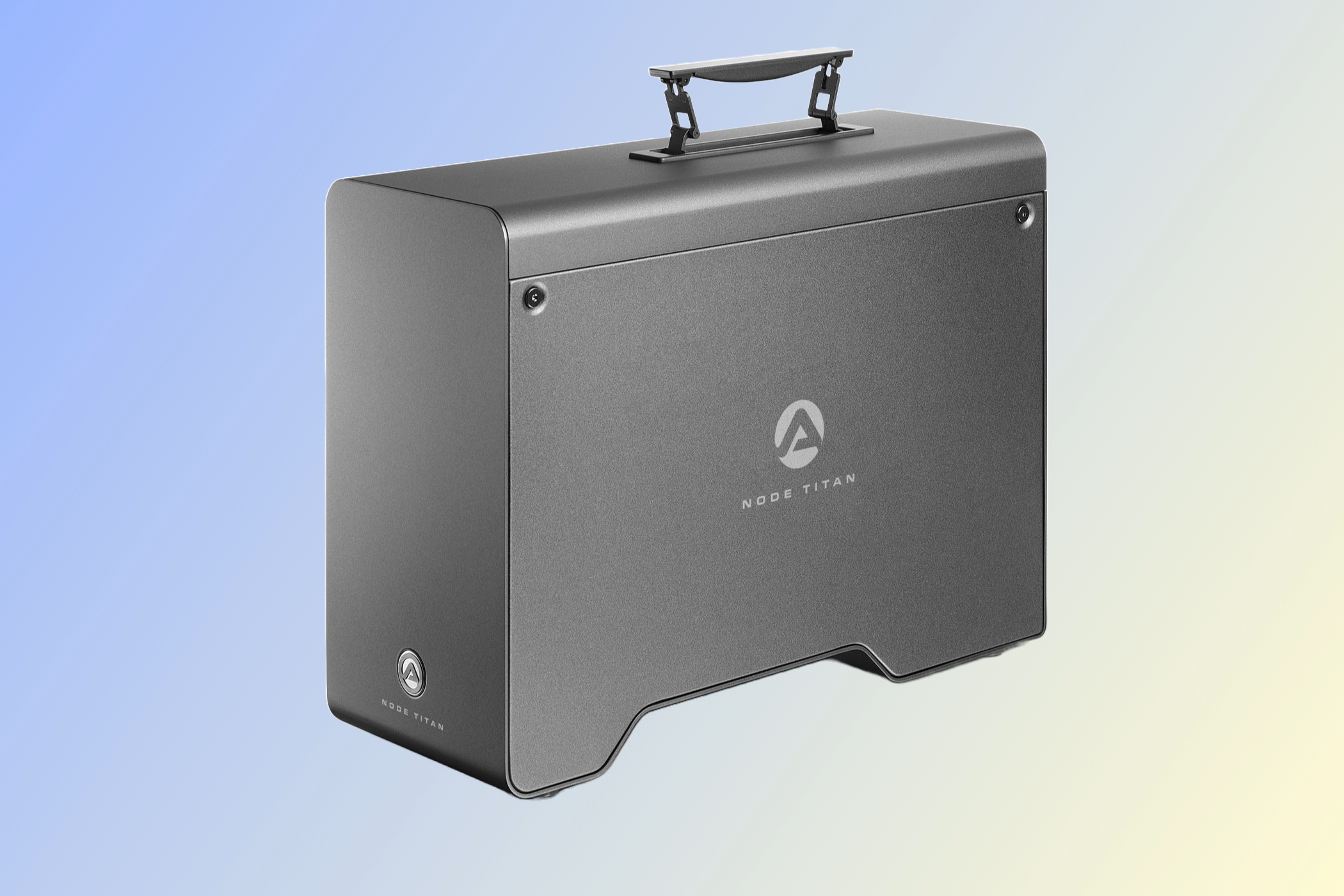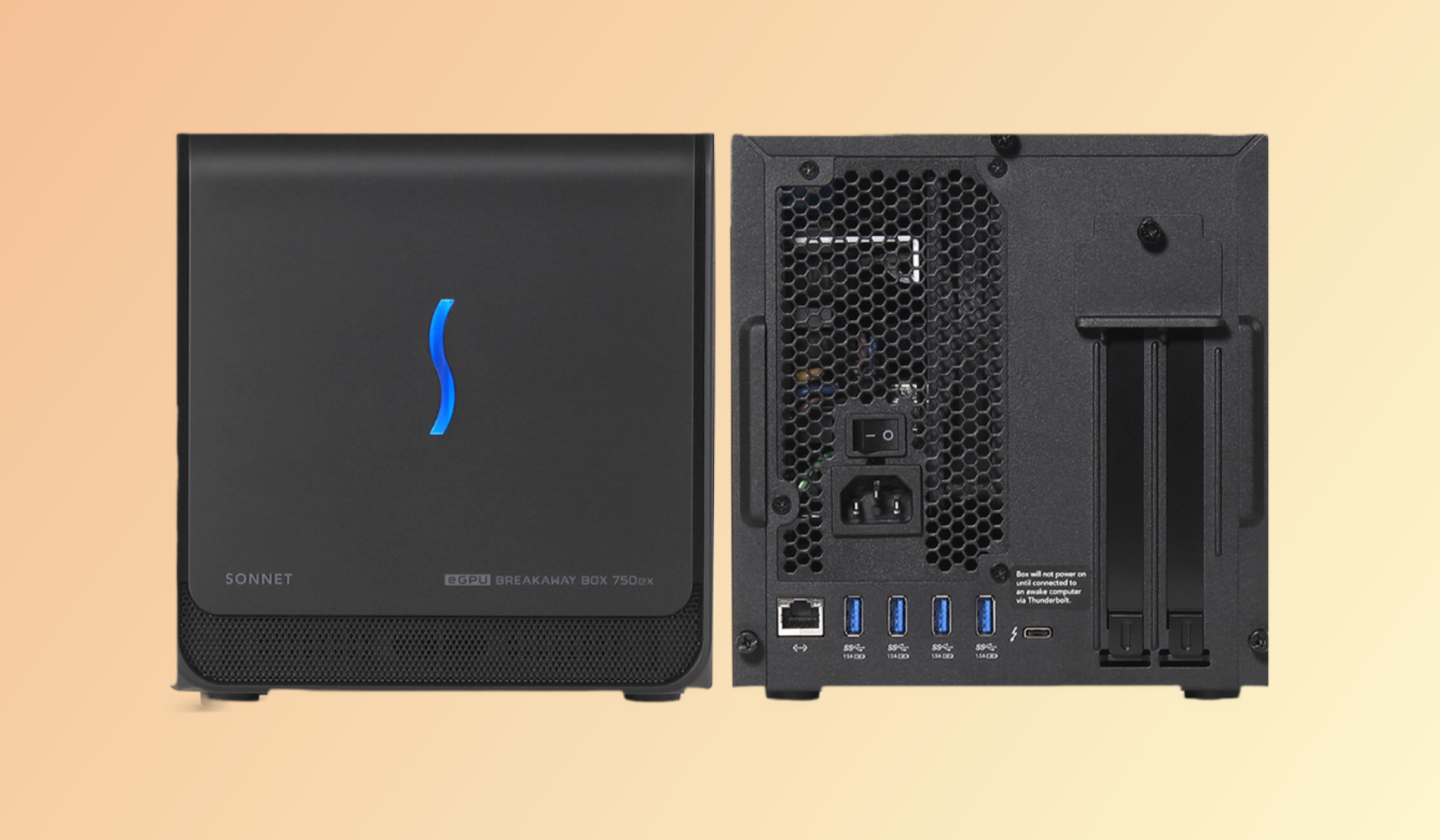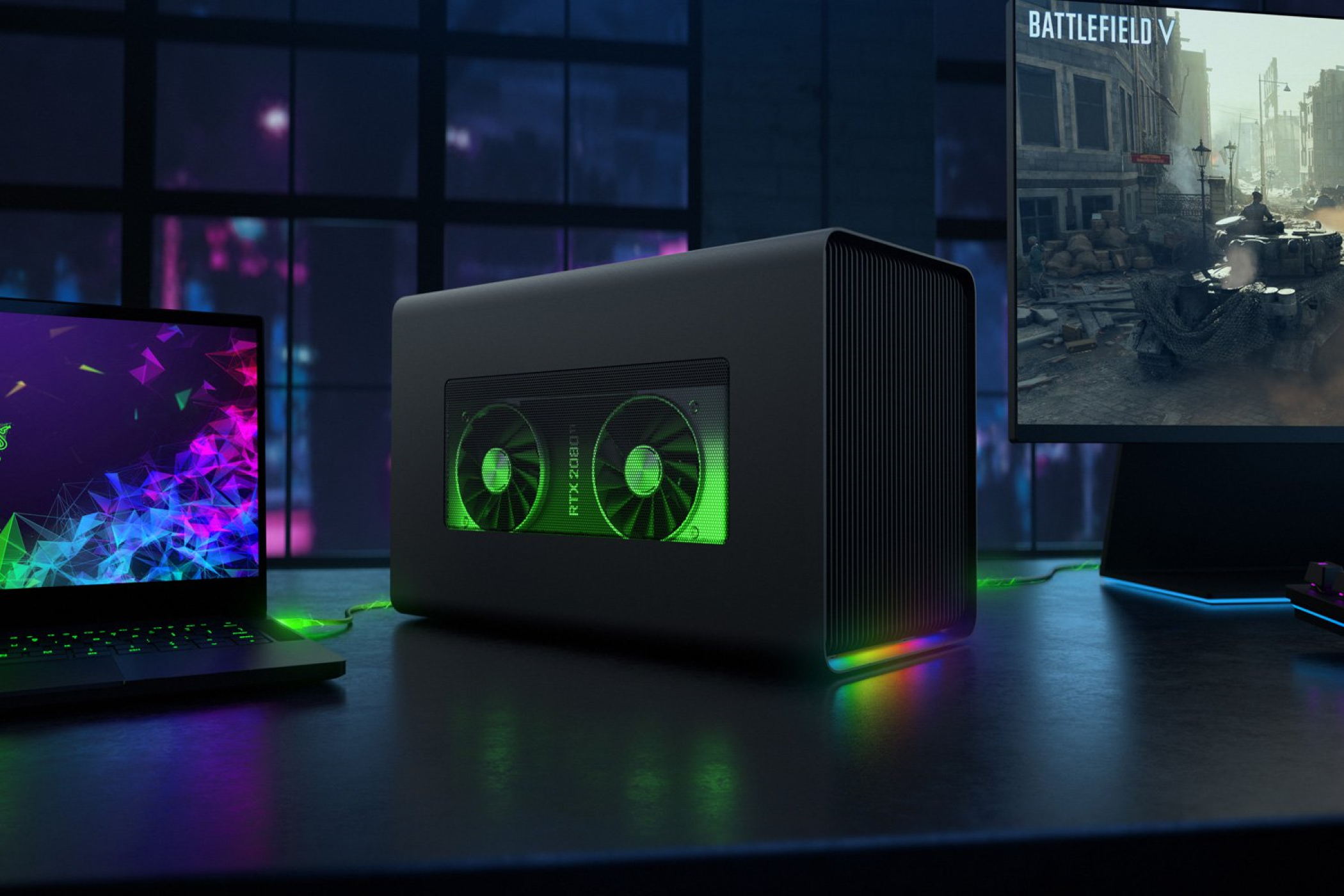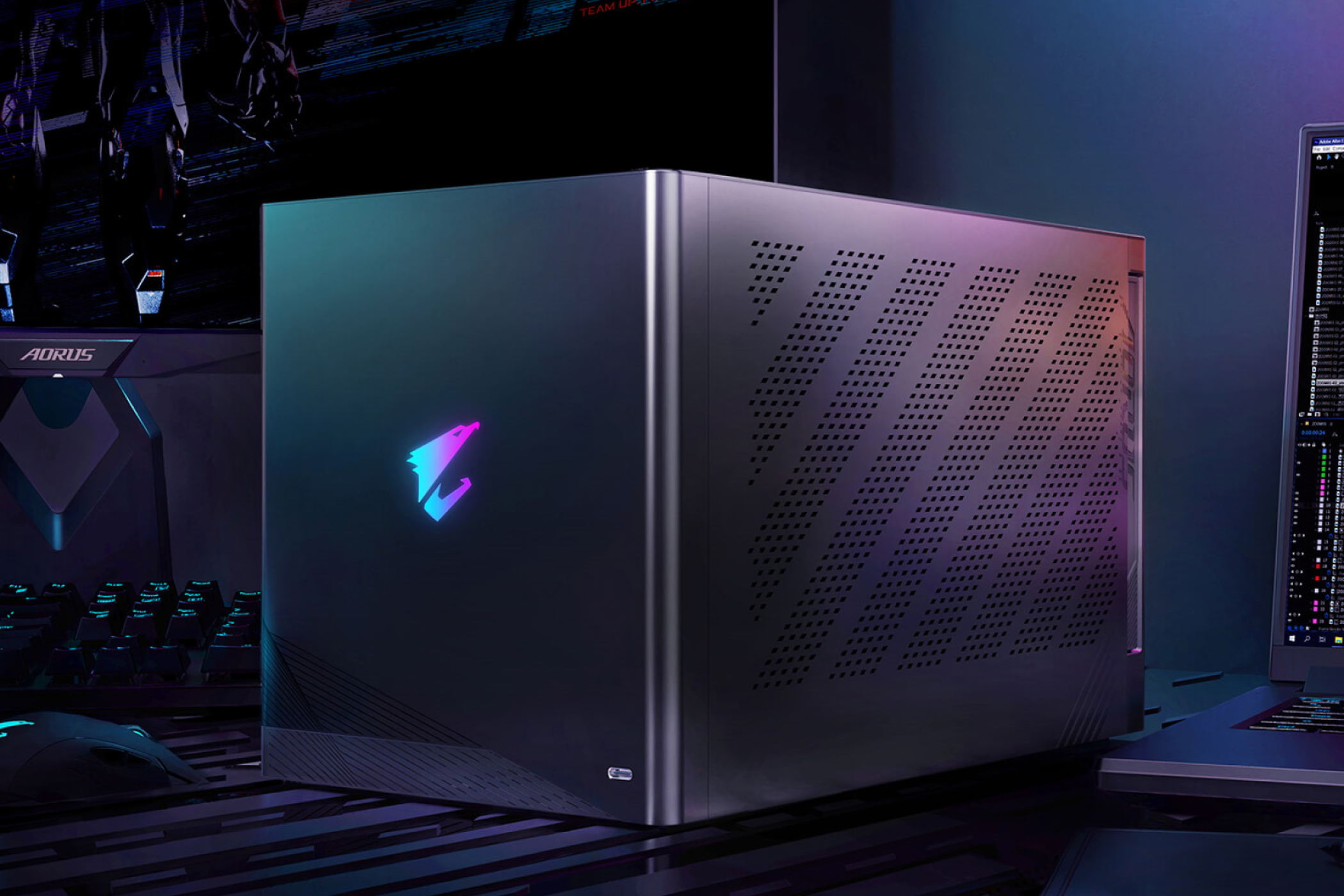An external GPU enclosure allows you to connect a dedicated, desktop-class GPU to your laptop or any other slot-less PC, enabling you to use the PC for deep learning, video editing, gaming, or any other workload that requires a powerful GPU.
What to Look for in an External GPU Enclosure in 2023
If you own a laptop, NUC, or any other PC that doesn’t have a dedicated graphics card or a PCIe port to install one, you can connect a desktop-class GPU to your PC with the help of an external GPU enclosure. Just get a GPU, install it into the enclosure, and connect the enclosure to your PC via a Thunderbolt port.
External GPU enclosures are simple contraptions that include just a handful of elements. First, you’ve got the enclosure itself, more or less an empty box populated by a power supply unit and a few other parts.
Aside from the enclosure and the PSU, you’ve also got a PCIe slot for installing the GPU, power cables needed to power the GPU, a Thunderbolt 3 port for connecting the eGPU enclosure to the laptop or other kind of slotless PC you want to augment (all newer models we’re focusing on in this guide come with Thunderbolt 3 support). Some eGPU enclosures also come with extra connectivity in the form of USB ports, and they can sometimes include a cooling setup made of one or a couple of case fans.
If you’re looking for an eGPU enclosure, graphics card clearance is the most important thing to focus on. Every eGPU enclosure should have a list containing supported graphics cards or the maximum GPU dimensions it supports, either on its store listing or its specs page on the manufacturer site. When some of the best graphics cards can be almost as massive as certain SFF enclosures, it’s important to be absolutely certain the eGPU enclosure you’re interested in can fit the GPU you plan on getting before pulling the trigger on either.
Once you’re certain that the enclosure you’re eyeing can house your graphics card of choice, check out the PSU inside and ensure it’s powerful enough to power the GPU without issues. Don’t just focus on PSU wattage—also make sure there are enough PCIe power connectors to power the GPU. For instance, some high-end graphics cards feature three 8-pin PCIe power connectors. If the enclosure you plan on getting packs enough power for a high-end graphics card with three 8-pin power connectors—for example, 500W—but only comes with two of those connectors, you won’t be able to power that particular GPU.
Also, NVIDIA RTX 40 series graphics cards, including the RTX 4070 and more powerful models, feature 12VHPWR power connectors that either require an ATX 3.0-compatible PSU with 12VHPWR power cables or a 12VHPWR adapter. You should be fine if the card you want can work with a 12VHPWR adapter featuring two 8-pin PCIe connectors. On the other hand, if the card in question needs a 12VHPWR adapter with three or four 8-pin connectors, an eGPU enclosure that includes a PSU with only two 8-pin PCIe cables won’t work with that graphics card.
Fortunately, many external GPU enclosures support swapping out the prebuilt PSU unit. So, if you plan on getting a high-end GPU not supported by the enclosure you plan on buying, check whether it’s possible to swap out the PSU in the said enclosure. If it is, you can replace the PSU and use any card you want, as long as you can fit the PSU, and the GPU, inside the enclosure.
Next, let’s talk about Thunderbolt 3 connectors and extra USB ports. Firstly, despite Thunderbolt 4 being the latest iteration of the standard, you won’t find eGPU enclosures equipped with Thunderbolt 4 ports. Because both Thunderbolt 3 and Thunderbolt 4 top out at 40Gbps, there’s no advantage in using the newer standard with an external GPU enclosure.
Concerning extra USB ports, those can be regular USB-A or USB-C ports that only support data transfer, or they can be USB-C ports that support both data transfer and USB Power Delivery (USB PD). In case one or more of the available USB-C ports support USB PD, the manufacturer should clearly label the maximum amount of power, in watts, delivered via the said USB-C port. You should have no trouble finding that info on the online store listing or the product webpage on the manufacturer’s website.
|
How Did We Research |
||
|
Models Evaluated |
Hours Researched |
Reviews Analyzed |
|
12 |
5 |
8 |
How-To Geek’s product recommendations come from the same team of experts that have helped people fix their gadgets over one billion times. We only recommend the best products based on our research and expertise. We never accept payment to endorse or review a product. Read More »
Best External GPU Enclosure Overall: Razer Core X
|
Pros |
Cons |
|---|---|
|
✓ Attractive design |
✗ Expensive |
|
✓ Straightforward GPU installation procedure |
|
|
✓ 650W PSU |
|
|
✓ Supports triple slot GPUs |
The Razer Core X is placed step below the company’s flagship Core X Chroma eGPU enclosure, and if you need an enclosure that packs a powerful PSU and can be fitted with a 3-slot GPU, you’ll love this one. The enclosure features a design that successfully mimics a compact Mini-ITX case, and we love how it looks. Thanks to the lack of snazzy details, the enclosure will look great with any laptop, NUC, or other PC that can’t house a desktop GPU.
Specs-wise, you’ve got a 650W internal PSU that can power any GPU in existence—however, only two PCIe 8-pin power connectors impose some limits on which graphics cards you can use. Luckily, the Core X supports up to three-slot GPUs up to 330mm in length, meaning you can fit most modern GPUs in there as long as you can power them with the included PSU. If the PSU is not up to snuff, you can replace it, allowing you to use high-end cards with high power requirements and GPUs with a 12VHPWR connector. The Razer Core X doesn’t come with extra connectivity, but the included Thunderbolt 3 port can power your laptop with up to 100W.
The GPU installation procedure is pretty straightforward, thanks to the sliding mechanism on the rear of the enclosure. Just pull out the folding handle, slide out the PCIe slot and cables, install the graphics card and connect it to the PSU, and then slide the whole assembly back into the enclosure. Thanks to the sliding design, you can use cards longer than the maximum length of 330mm; you just won’t be able to slide the assembly fully into the enclosure. Regarding negatives, the $400 is steep for what you’re getting, but at least it looks gorgeous and supports three-slot GPUs.
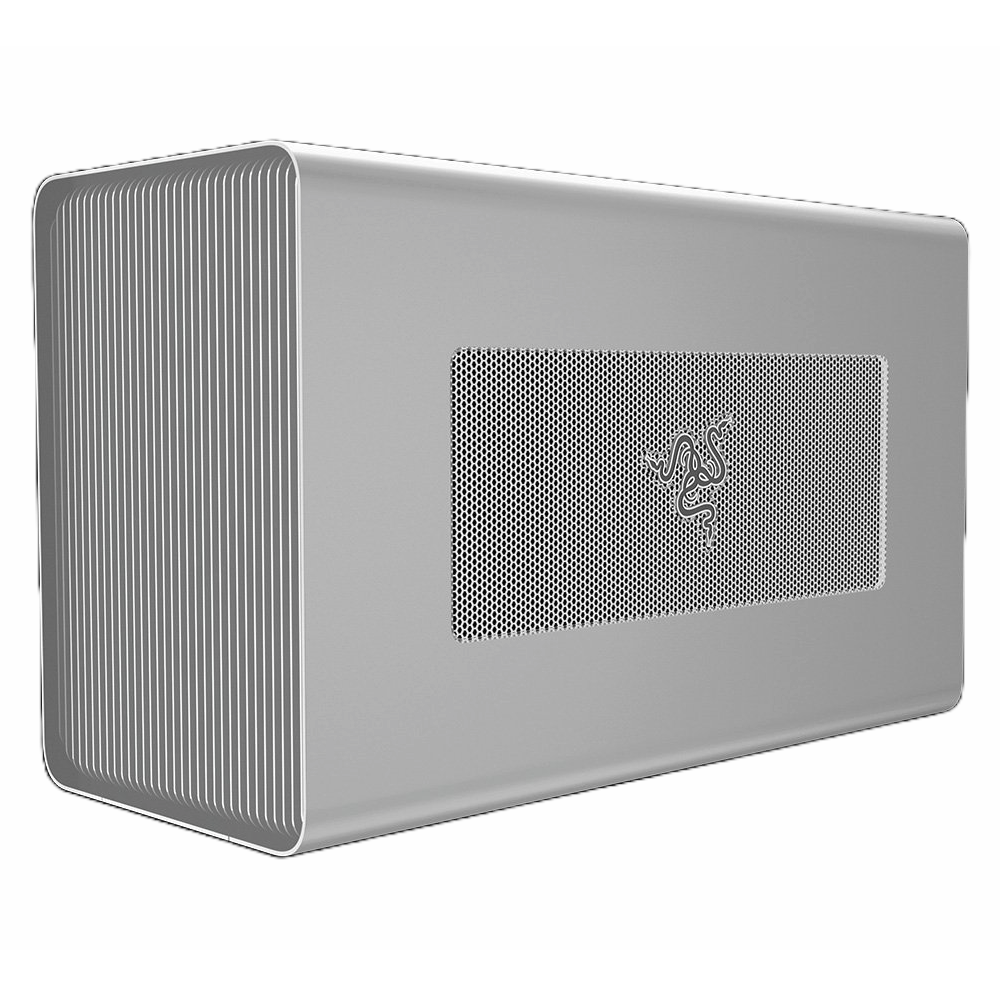

Razer Core X
Best External GPU Enclosure Overall
Aside from extra connectivity, the Razer Core X offers everything one might need in an eGPU enclosure. It packs a powerful PSU, looks great, and isn’t too costly.
Best Budget External GPU Enclosure: Akitio Node Titan
|
Pros |
Cons |
|---|---|
|
✓ The handle’s handy |
✗ Potential clearance issues with high-end GPUs |
|
✓ 650W PSU |
|
|
✓ Competitive price |
The Akitio Node Titan is one of the best budget eGPU enclosures on the market thanks to its utilitarian design that includes a handle for effortlessly moving it around, a very attractive $250 price point, a 650W power supply with two 8-pin PCIe power connectors, and Thunderbolt 3 power with 85W power delivery.
On the flip side, the Akitio Node Titan only supports two-and-a-half-slot GPUs, which isn’t ideal in a world where high-end graphics cards can take up to four slots. At least the max length is set at 320mm, which is long enough for almost any graphics card sans flagship models such as the NVIDIA RTX 4090 or the AMD Radeon RX 7900 XTX.
Overall, the Akitio Node Titan is perfect for mid-range and low-end GPUs. While you can probably fit older high-end GPUs in it, you might encounter clearance issues stemming from the limited 2.5-slot GPU compatibility.
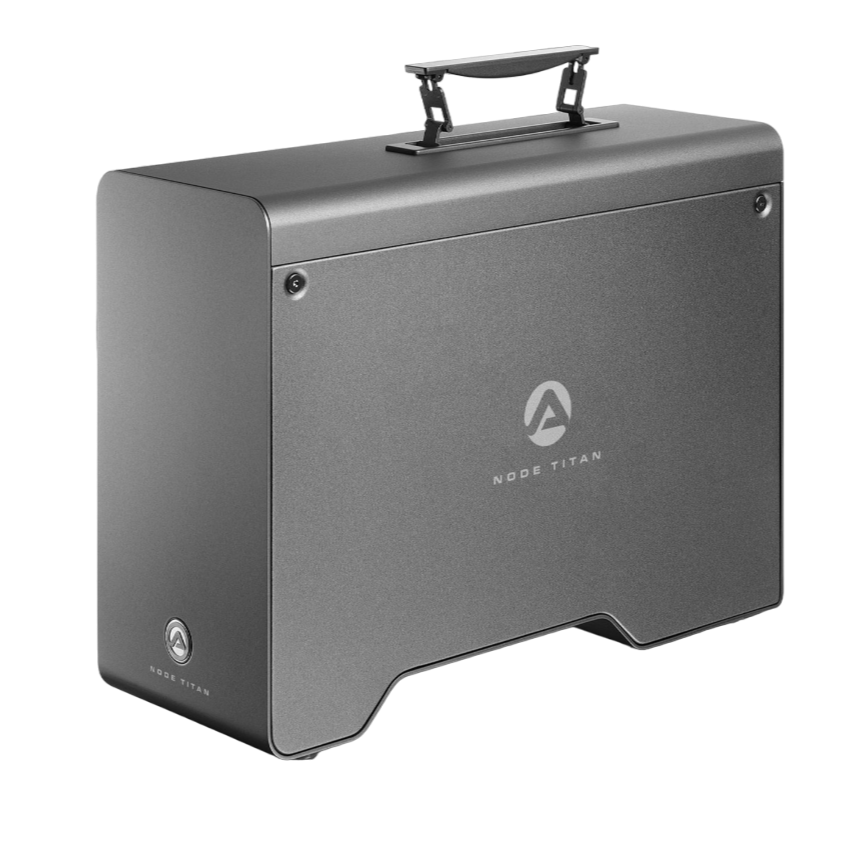

AKiTiO Node Titan
Best Budget External GPU Enclosure
If you’re looking for a budget eGPU enclosure the Akitio Node Titan is one of the best choices. It doesn’t feature the most straightforward GPU installation procedure but everything else is top notch.
|
Pros |
Cons |
|---|---|
|
✓ Lots of high-speed USB ports |
✗ Can’t fit most high-end and flagship graphics cards |
|
✓ Gigabit Ethernet port |
|
|
✓ 750W PSU |
|
|
✓ Great Price |
If you’re in the market for an external GPU enclosure for a laptop with only a few USB ports that are always taken, consider getting the Sonnet eGPU Breakaway Box 750ex. This is a perfect eGPU enclosure for laptops because it packs four USB-A 5Gbps ports as well as a Gigabit Ethernet port, a 750W PSU with two 8-pin PCIe power connectors, and a Thunderbolt 3 port with 85W PD. This is all for the price of $350, which is a steal for those specs.
Unfortunately, specs can’t make up for possible issues with the GPU clearance. The Sonnet eGPU enclosure supports dual slot cards up to 312mm in length, meaning you won’t be able to fit flagship GPUs that are often longer and wider than what this enclosure will support
With that said, if the GPU you’re interested in can fit inside this enclosure, the Sonnet eGPU Breakaway Box 750ex is an excellent choice due to its competitive price, attractive design, extra connectivity options, and capable PSU.
Before we move on, note that M1 and M2 MacBooks do not support external graphics cards. If you plan on getting this eGPU enclosure for your MacBook, you must have an Intel-based MacBook.
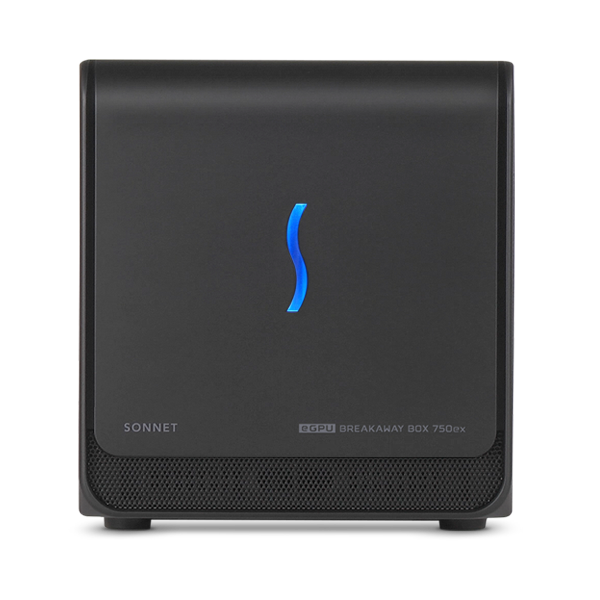

Sonnet eGPU Breakaway Box 750ex
Best External GPU Enclosure for Laptops
The Sonnet eGPU Breakaway Box 750ex includes a powerful PSU, support for dual slot GPUs, as well as four high-speed USB ports alongside a Gigabit Ethernet port. A perfect choice for laptop owners looking for an eGPU enclosure with lots of extra connectivity options.
Best External GPU Enclosure for Gaming: Razer Core X Chroma
|
Pros |
Cons |
|---|---|
|
✓ Tasteful RGB implementation |
✗ Pricey |
|
✓ Eye-catching aesthetics |
|
|
✓ 700W PSU |
|
|
✓ Triple slot GPUs support |
The Razer X Chroma is something of a non-identical twin to the regular Razer Core X enclosure. The case design is almost identical, but the differences are noticeable on the rear of the enclosure and with an RGB light bar at the bottom on the front side. It looks quite cool and isn’t over the top and gaudy like RGB implementations we’ve seen with other pieces of gaming gear.
Regarding the rear side, the Razer Core X Chroma has four extra USB-A 5Gbps ports, which can be very handy for laptops with limited connectivity options. You’re also getting a Gigabit Ethernet (RJ-45) port and a Thunderbolt 3 port with 100W of USB power delivery, the only port found on the regular Core X version of the enclosure.
The final upgrade found on the Core X Chroma is a 700W PSU instead of a 650W unit. While a welcome improvement, the decision not to add a third PCIe 8-pin power connector means that you’re still limited to GPUs with two power slots and graphics cards that can work with dual 8-pin to 12VHPWR adapters.
The internal GPU clearance stayed the same compared to the Core X, meaning you can use triple-slot GPUs up to 330mm long and up to 160mm in height. We wouldn’t mind a wider design if it would mean the enclosure could fit flagship GPUs that can take up to four PCIe slots, but the current size is great for most graphics cards as is.
Concerning the price, while the regular Core X enclosure is expensive, $500 for the Chroma version is still pricey but a solid upgrade over the base model. For $100 more, you get lots of RGB, four high-speed USB ports, and an Ethernet port.
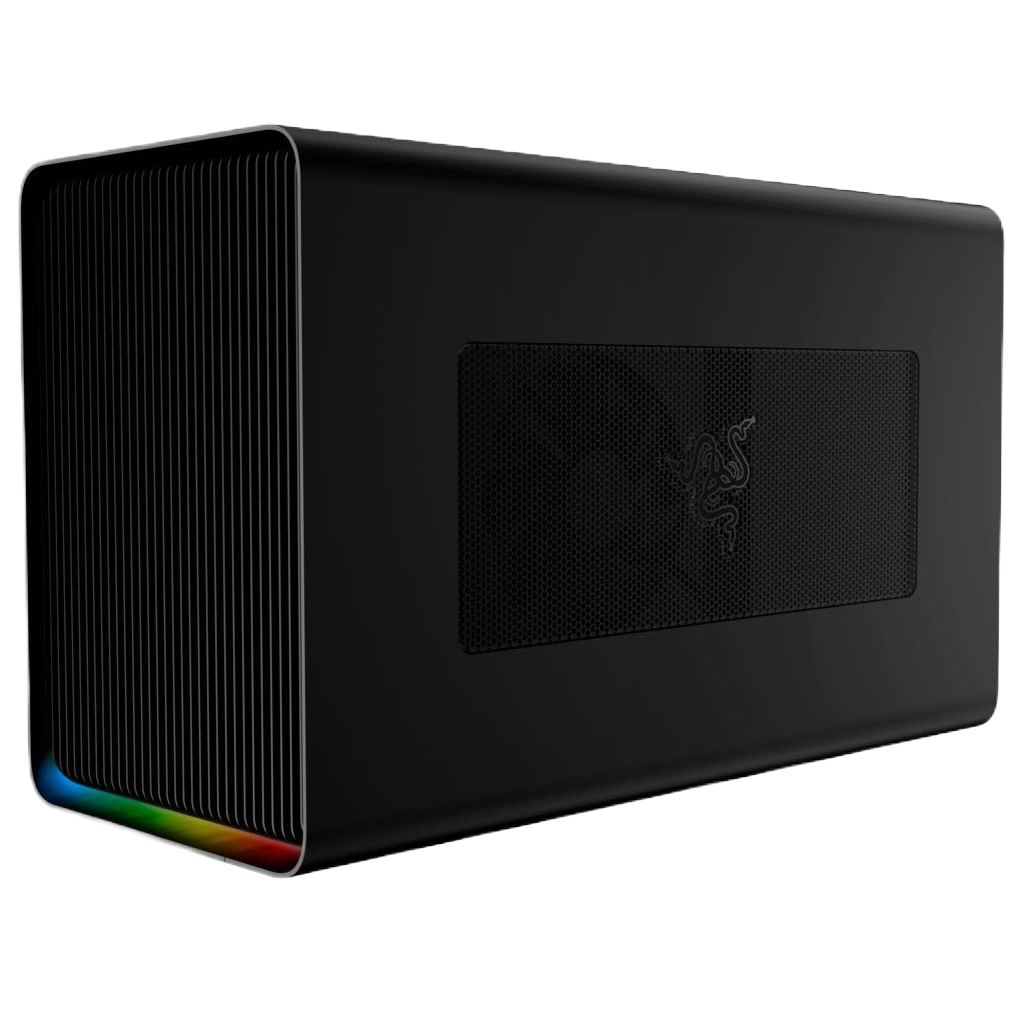

Razer Core X Chroma
Best External GPU Enclosure for Gaming
The Core X Chroma from Razer is a high-end eGPU enclosure that looks sleek, features tasteful RGB implementation, packs lots of extra connectivity, and supports massive, three slot graphics cards. It’s a full package and one of the best eGPU enclosures around.
|
Pros |
Cons |
|---|---|
|
✓ Comes with the fastest GPU around |
✗ Very expensive |
|
✓ Three 10Gbps USB ports |
✗ You’re most likely stuck with the pre-installed GPU |
|
✓ 10Gbps USB-C port at the front |
✗ Bulky |
|
✓ Superb cooling solution |
|
|
✓ Gigabit Ethernet port |
Our last pick isn’t an empty eGPU enclosure you have to equip with a dedicated graphics card. Gigabyte’s Gaming Box series of eGPUs offer the whole package. In other words, you’re getting an actual GPU inside the enclosure, and all you have to do is connect it to your computer.
The flagship model from the Gaming Box lineup is the Gigabyte AORUS RTX 4090 Gaming Box, which packs the most powerful consumer-grade graphics card available, the RTX 4090. This product is a beast, packing a full-fledged, liquid-cooled, desktop-grade RTX 4090 that will make any game work perfectly as long as your CPU is up to snuff.
On the back, you can find the required Thunderbolt 3 port, two USB-A 10Gbps ports, and a Gigabit Ethernet port. The included GPU features three DisplayPort 1.4 and a single HDMI 2.1 video output. Finally, you can find an additional USB-C 10Gbps port on the front, which is a nice extra.
Regarding negatives, the astronomical price is the biggest turnoff. The Gigabyte AORUS RTX 4090 Gaming Box is also a massive-looking assembly, bigger than many SFF cases. Finally, you’ll have difficulty replacing the prebuilt GPU if you ever decide to upgrade since the custom liquid cooling system is most likely incompatible with regular graphics card designs.
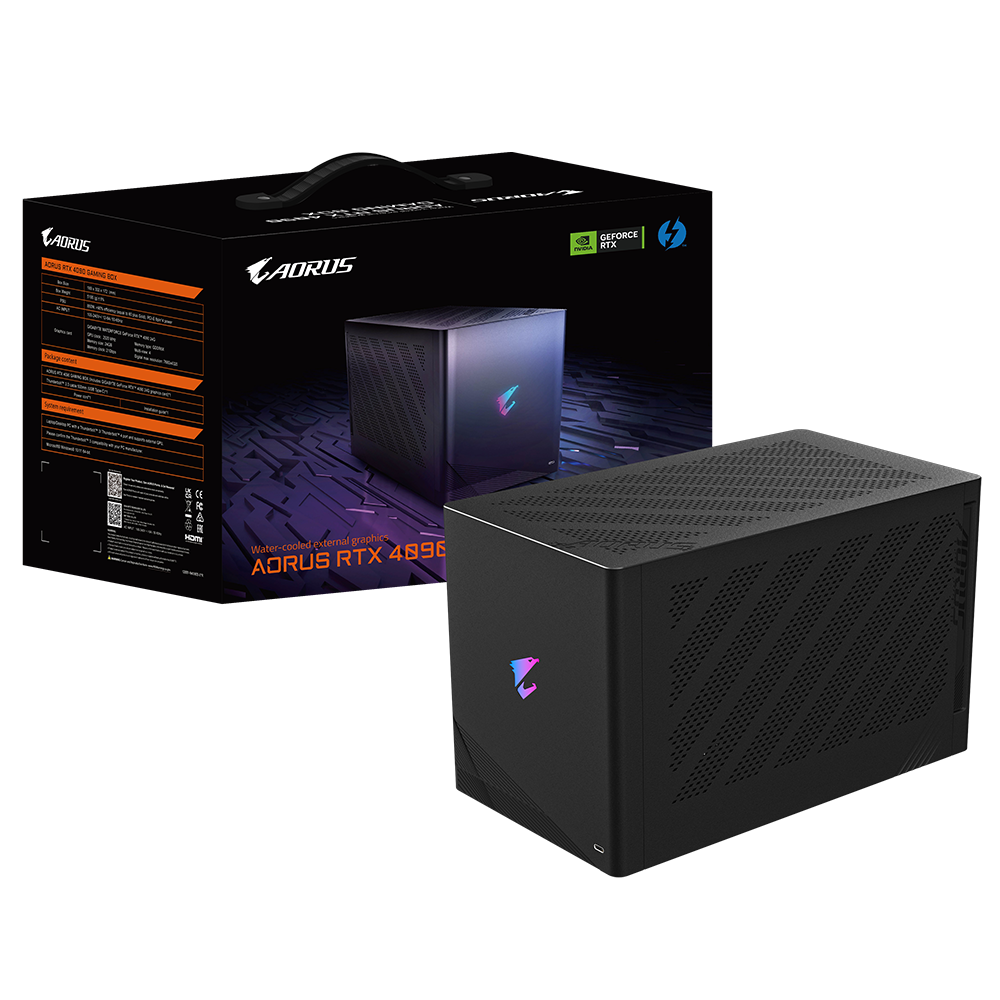
Gigabyte Aorus Gaming Box
Best External GPU
Instead of being an empty eGPU box, the Gigabyte AORUS RTX 4090 Gaming Box packs a monstrous RTX 4090, offering overkill performance no matter the workload. This is the ultimate choice on the eGPU market.
FAQ
Are external GPUs and eGPUs the same?
External GPUs and eGPUs are the same. The two terms are used interchangeably for external graphics cards that you can hook to a PC. They can be custom designs that you cannot upgrade with a new GPU, such as ASUS’ XG Mobile products, or they can be regular GPUs housed inside eGPU enclosures. eGPU enclosures are housings inside which you can slot an external GPU. eGPU enclosures can come with a pre-installed GPU, but in most cases, you have to provide the GPU yourself.
How do I connect an external GPU to my laptop or MacBook?
eGPU enclosures use Thunderbolt 3 standard to connect to laptops and Intel-based MacBooks. To connect an external GPU to your laptop or MacBook, plug a Thunderbolt cable into two Thunderbolt ports located on the eGPU enclosure and on your laptop or Intel-based Macbook.
Can I use an internal GPU as an external one?
You can. As long as the enclosure can fit it, you can use any desktop-class internal GPU with an external GPU enclosure.
Do all GPUs work with all CPUs?
Most modern GPUs work with every x86 CPU. That said, make sure that your CPU and GPU are somewhat similar in power to avoid creating a bottleneck on either side.


